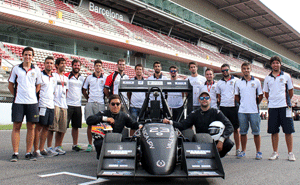Like a Corvette Stingray
33 UPV students present FSUPV-03, a race car with a daring geometry capable of accelerating from 0 to 100 km/h in 3.9 second
[ 28/06/2016 ]
It has similar acceleration as a Chevrolet Corvette Stingray but it was made by university students at the Universitat Politècnica de València. That's the FSUPV-03, the new competition car UPV will drive in Formula Student, the most important motor competition for students in Europe. Formula Student is a high performance engineering project organized by the Institution of Mechanical Engineers, supported by top level professionals in the automobile industry.
In 2014, after two years working on the project, a team of 32 students at UPV became the first Valencia motor racing team to take part in the competition. In their first season, they were the best rookies in the Hockenheimring circuit in Germany, and in 2015, they achieved the best results ever obtained by a Spanish team.
Sleeker aerodynamics
One year later, the FSUPV Team returns to the racetrack with a different car, "with a daring geometry," according to Juan Antonio García Manrique, professor in the Department of Mechanical and Materials Engineering, member of the Institute of Design and Manufacturing at UPV and the project's "father." One innovation of this third prototype is the aerodynamics, which are sleeker and, as they defined it, "exuberant."
Due to the changes introduced, the car is able to accelerate from 0 to 100 km/h in 3.9 seconds. "During simulations, we were able to save 0.8 seconds per round, which is an excellent starting point before the season starts. There are good feelings all around: the driver is more comfortable in the compartment and the car corners better," explains Javier Catalán, an undergraduate student in mechanical engineering and the administrative director of the FSUPV Team.
1,700 hours in the oven
95% of the vehicle was designed and built by UPV students. "We have spent 1,700 hours in front of the oven, looking at the pieces cooking. We have spent a lot of time and effort on this project and we are very proud," says Lucas Mestre, a Master's student in aeronautical engineering and one of the team's technical directors. The FSUPV-03 weighs about 212 kg -the best German and American teams achieve similar numbers- and it still has the 600 cc Honda engine that gave them good results in the 2015 season.
In order to make the prototype, the students had the help of 63 official sponsors. "These companies provide components, lend equipment, and invest hours of work in order to solve problems and provide a budget. They are also part of the project," says Arturo Prieto, an undergraduate student in industrial electronics and automation engineering, and a technical director.
During the presentation, the Rector of the Universitat Politècnica de València, Francisco Mora, emphasized this part of the project. "Jumping from the class to the box involves a lot of handicaps. Achieving the support of more than 60 companies gives an idea of the perseverance and the attitude of this team," concluded Mora.
Formula Student UPV and Spontaneous Generation
FSUPV Team is a community of students and graduates involved in the Spontaneous Generation platform, launched from the Universitat Politècnica de València in order to help their more competitive and international students. Under this umbrella, UPV spreads an institutional support program of the most active associations to carry out their extracurricular activities (participation in events, competitions, international contests, voluntary work programs) and serve as an example for the rest of the students.
Thus, one of the next projects for the Formula Student participants is to create a school where future engineers can take their first steps in the university motor racing team. The next meetings are planned for the end of the summer. From August 9 to 14, the FSUPV-03 will compete in the Hockenheim circuit, in Germany, to test the new skills acquired by the new team from the Universitat Politècnica de València. Later, it will compete in Montmeló, Spain, from August 24 to 28.
Noticias destacadas
 La UPV, en la élite científica mundial
La UPV, en la élite científica mundial
121 investigadores e investigadoras de la UPV figuran en el World's Top 2 % Scientists de la Universidad de Stanford
 Palestina: 75 años de ocupación, resistencia y dignidad
Palestina: 75 años de ocupación, resistencia y dignidad
Periodistas, activistas y responsables de ONG en favor de la paz y la defensa de los derechos humanos se reúnen el viernes 30 de diciembre en la UPV en una jornada de reflexión académica y ética sobre el conflicto, ¡inscríbete y asiste!
 Sus Majestades los Reyes visitan el proyecto "Salvem les Fotos UPV / Recuperar las memorias"
Sus Majestades los Reyes visitan el proyecto "Salvem les Fotos UPV / Recuperar las memorias"
La iniciativa de la UPV ha permitido la recuperación, conservación y restitución de cerca de 340.000 fotografías dañadas por la DANA
 Con los más vulnerables
Con los más vulnerables
La UPV potencia su histórica Cátedra de Infancia y Adolescencia, referencia nacional y con más de 12 años de historia y compromiso social
 En busca del talento UPV
En busca del talento UPV
La Universitat Politècnica de València y Oracle firman un convenio para fomentar la formación en Tecnologías de la Información


